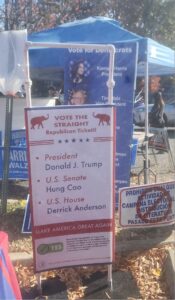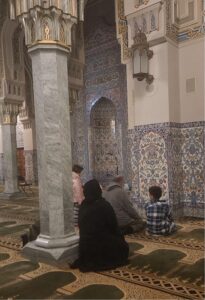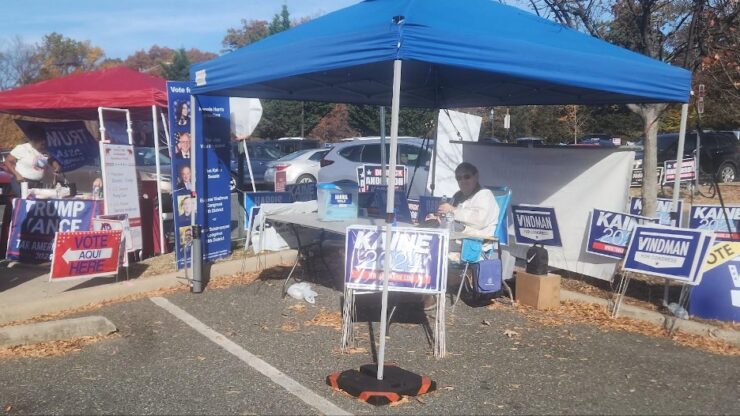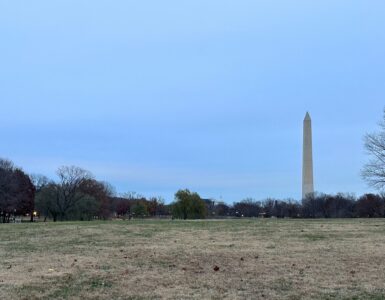The 2024 presidential election highlighted the diverse political motivations within the DMV’s Arab American community. While some backed Trump, others voiced disillusionment with his policies, reflecting the community’s varied experiences and priorities.
As the area’s Arab American population continues to grow and evolve, so too does its political identity that is shaped by a deep-rooted call for representation, cultural understanding, and security. Community members say this evolving voice seeks not only a place in the political discourse but also an active role in shaping the nation’s future.
The growing political influence of Arab Americans was evident in their shift toward Trump in the 2024 election, reflecting a change in priorities and allegiances. Dissatisfaction with Democratic leadership prompted many within the community to reevaluate their political leanings.
Khadija El Mouden, a Moroccan American and catering specialist at a French restaurant in Falls Church, Va., embodies the shifting political tides within her community. For years, she said she consistently supported Democrats, but the 2024 election marked a turning point.
“My vote was always for Democrats, but not anymore,” she said, reflecting on her decision to turn to Trump this time around.
El Mouden’s shift was driven by a blend of personal and cultural priorities, including her belief that the economy thrived under Trump’s leadership.

“The economy was better when Trump was president, I can’t stand another term under these conditions,” she said.
“We’ve tried the Democrats, and they haven’t listened. It’s time to give someone else a chance.”
Economic concerns were at the forefront of Arab American voters’ minds. Liam Berry, a data analyst with the Arab American Institute, said that more than 81% of respondents cited the economic burden as the key issue in a recent poll of 500 Arab American registered voters by the Arab American Institute.
A central message that resonated with Arab American voters was the Trump campaign’s emphasis on economic recovery and security, offering practical solutions to address the immediate challenges many across the community were facing.
“I won’t have to pay tax on tips; that makes me happy,” said Sam M., a Tunisian emigrant who recently moved to Washington. Sam was not comfortable sharing his full name.
Sam works at a Shawarma restaurant, and he said he mainly relies on tips to make ends meet. For him, supporting Donald Trump in the recent election was a practical choice.
“He is the best for average workers like me,” he said.
Sam said Trump’s economic promises resonated deeply, adding that he finally felt heard.
“I like that he listens to the Arab community. Maybe he’ll build a new era of understanding with us,” he said.
Similarly, Mohammed Ezzahir, who runs a security business in Northern Virginia, echoed sentiments about Trump’s economic leadership and praised him for creating a stronger economy during his term.
“He is a businessman, he knows how to roll the wheel,” he said.
Ezzahir also praised Donald Trump for not declaring any wars during his term, therefore he said he believe Trump will restore peace and stability in the Middle East and Ukraine.
“There was no war when he was in office, I think he proved he is not a war person unlike the other party. Now we’re on the brink of World War III,” he said.
While Trump’s messaging resonated with some, there remains skepticism about his past policies, particularly those targeting Arabs, Muslims, and immigrants, as well as doubts about his ability to deliver lasting solutions.
“Trump’s promises often feel like empty gestures, not genuine commitments,” said Hammad Elbedour, a Palestinian American computer science professor at George Washington University.
Elbedour said that he perceived his community support for Trump with much disappointment.
“Unfortunately, we’re divided, and Trump is good at making promises. He gave them what they wanted to hear. He showed that he cares but I don’t trust him or anything he said just like any other politician,” he said.
One of Elbedour’s primary concerns was Trump’s decision to move the U.S. embassy in Israel to Jerusalem, as such actions embolden settlement expansions and diminish hopes for a fair resolution for Palestinians.
“It legitimized Israel’s claim over the city and undermined Palestinian sovereignty,” he said.
Many Arab Americans expressed criticism of the Biden administration’s failure to push for a ceasefire in the long ongoing Middle Eastern war, feeling that diplomatic efforts were insufficient to address the humanitarian crisis in Gaza and Lebanon. On the other hand, Trump’s promises to end the war appealed to some voters, even as skepticism remained about his true intentions and alignment with Israeli policies.
“I don’t think there’s a day that Trump gives a thought to the Palestinian cause in any other way than through Israel’s lens,” said Berry.

In addition to economic challenges, and foreign policy, a segment of conservative Arab Americans in the DMV area felt that their family values and cultural concerns were being overlooked by the broader Democratic coalition.
Trump’s promises including restricting federal funds for gender-affirming care, banning transgender surgeries for minors, and prohibiting schools from promoting the idea of gender transitions draw many supporters among the community who are concerned about these issues.
“I’m worried about my kids, they’re being introduced to things like sexuality at a very young age. This doesn’t align with our culture or values,” said Kadir Mari, an Ethiopian American who has lived in D.C for 14 years.
Mari is a father of three young children, including a six-year-old kindergartner he said he decided to homeschool. He said that while he doesn’t have much political knowledge, he couldn’t wrap his head around the idea of his children being exposed to discussions about sexuality at an early age in school.
This concern led him to make the decision to homeschool as a way to shield his children from what he described as premature exposure to sensitive topics.
This issue has been significant enough for him and many within the Arab community in the DMV area to consider Donald Trump as an alternative in the recent election.
“I’m afraid of decisions being made in schools without my consent or me being in the loop, especially regarding gender changes,” said El Mouden.
With one child in elementary school and another in high school, El Mouden emphasized her desire to be fully informed about any steps her children take, especially while they are still under her responsibility as minors. She said parental awareness and involvement are essential in guiding her children through important life decisions.
For some of these Trump supporters, the decision to support him was more about dissatisfaction with the Democrats than genuine support for his platform. Skepticism about his past policies and motives persisted among many within the community who couldn’t find comfort in either major party.
Fatin Mojahid, an American Egyptian nursing student, voted for a third-party candidate, citing a deep distrust of both Trump and the Democrats.
She said that neither major party aligned with her values, prompting her to look for alternatives during the election.
“There is no way I vote for Trump, he sparked discrimination against immigrants and Muslims in 2016. I can’t forget that, and I can’t trust him,” she said.















Thank you for giving our voice a platform. This election was a true test of choices and challenges.
Thanks so much for this article. It summarizes Arabs position towards 2024 Elections with its significance for Arabs communities.
Keep up good work !